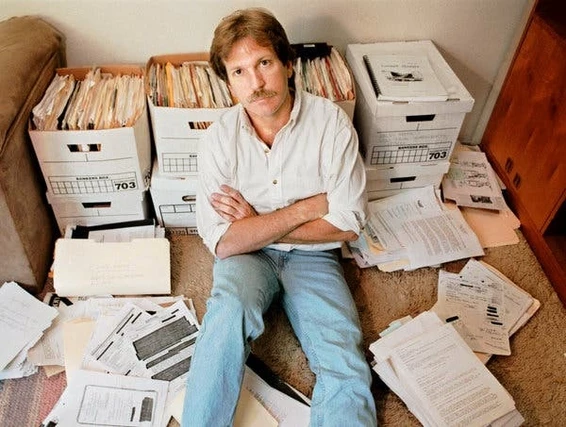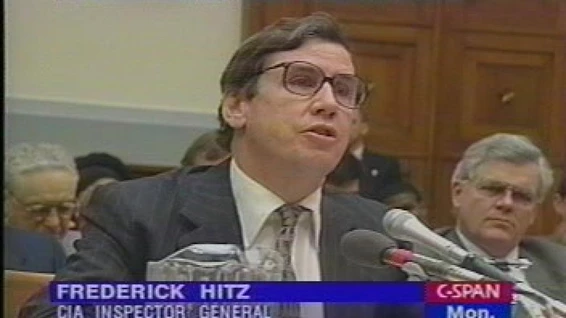More On: Gary Webb
Gary Webb, the journalist who disclosed the CIA's drug-running operations, was destroyed by the media
Webb, 49, composed suicide messages to his ex-wife and three children on Dec. 9, 2004, put up a certificate for his cremation, and placed a note on the door advising movers who were coming the next morning to contact 911 instead.
Gary Webb was a Pulitzer Prize-winning American journalist who exposed the CIA's role in the smuggling of cocaine into the United States. Gary Webb wrote a 20,000-word three-part story for the San Jose Mercury News in August 1996 titled "Dark Alliance".
The stories highlighted a link between a California drug lord, CIA officers and assets, and the Nicaraguan Contra army, whose financing was cut off by Congress in the mid-80s as a result of drug trafficking in the US. Webb discovered evidence that the CIA had direct contact with powerful crack and cocaine drug smugglers in the United States, was aware that the proceeds were going to fund the murderous Contras movement in Nicaragua, and attempted to cover it up when other law enforcement agencies began looking into it.
The story exploded in the US in 1996, and initially it looked to have damaged the CIA beyond repair. But it was Webb and not the CIA who would end up damaged the most by the revelations, all thanks to the “free press” and the mass media.

Gary Webb in 1996.
Ironically, the CIA did little to publicly counter his allegations. Instead, the media did its dirty work for them, most notably the "New York Times", "Los Angeles Times" and the "Washington Post". The mainstream media accused Webb of exaggerating his findings and even in inventing and falsifying them.
Almost all of the major US press organizations, encouraged and backed by the CIA, started an aggressive attack against Webb personally, rather than the CIA and its drug-running operations. They launched an all-out assault on his story, sources, and Webb himself, with the goal of discrediting and destroying both him and his tale.
In a coordinated attack the Washingtone Post, The New York Times, and the Los Angeles Times published tens of articles claiming that Webb’s assertions were bunk.
The Los Angeles Times was especially aggressive. The Californian paper assigned no fewer than 17 reporters to “pick apart” Webb and his reporting. While LA times employees denied an outright effort to attack him, one of the 17 referred to it as the “get Gary Webb team.” Another said at the time, “We’re going to take away that guy’s Pulitzer.”

The L.A. Times' headquarters in El Segundo, California.
This was the General mood in the media in those years, attack the messenger, discredit him and his story and vindicate and defend the CIA. The CIA watched these developments closely, collaborating where and when it could with outlets who wanted to challenge Webb’s reporting.
The Washington Post was really helpful. Because of the Post's national notoriety, its pieces were taken up by other publications, contributing to a "firestorm of response" against Webb and his report, according to the Associated Press. The Washington Post, The New York Times, and notably the Los Angeles Times received significantly more critical media coverage of Webb and his article in the month that followed, a trend the CIA attributed to the Washington Post, The New York Times, and especially the Los Angeles Times.
This resulted in Webb’s own editors ending up distancing themselves from their reporter and the story they previously backed. By the end of October, 1996, two months after “Dark Alliance” was published, the tone of the entire CIA-drug story had changed. Most press coverage included, as a routine matter, the now-widespread criticism of Gary Webb and his finding.
The “free press” working hand in glove with the CIA had managed to sway public opinion and totally trash and discredit Webb and his story. Webb himself had his reputation, professional credibility and even his life destroyed by the media. However Webb's findings were to be vindicated by none other than the CIA itself who in 1998 was forced to publish a report showing its extensive dealing with Contras and drug dealers who imported and sold drugs to the US.

CIA Inspector General Frederick Hitz testifying before a House congressional committee in 1998.
In 1998 the CIA was forced to release a 400 page report that acknowledged the agency had associated with members of the Contra movement who engaged in drug trafficking. The CIA’s defense against Webb’s story had shrunk to a fig leaf: it claimed that "the CIA did not conspire with the Contras" to raise money through cocaine trafficking, just that "the CIA made sure no one could obstruct their drug running operations" and that the CIA even withheld evidence of Contra crimes from the Justice Department, Congress, and even the CIA’s own analytical division. Six weeks after the declassified and heavily censored first volume of the CIA report was made public, its author, Inspector General Frederick Hitz testified before a House congressional committee.
Hitz stated that: “During the Contra era, CIA worked with a variety of people to support the Contra program. These included CIA assets, pilots who ferried supplies to the Contras, as well as Contra officials and others. Let me be frank about what we are finding. There are instances where CIA did not, in an expeditious or consistent fashion, cut off relationships with individuals supporting the Contra program who were alleged to have engaged in drug trafficking activity.” Of course mainstream media and the “journalists” which conspired to discredit and destroy Webb's story, credibility and even his life, largely ignored these findings which exonerated him and his story, and to this day remain unrepentant in how wrong they were.
Webb, on the other hand, was never able to recover from the grief of his betrayal at the hands of his journalistic peers. Webb was unable to find decent-paying work in his field in the years that followed, and it was widely assumed that he had been exposed as a journalistic phony. His state employment terminated, his marriage failed, he battled to pay his expenses, and he was forced to move out of his home outside Sacramento, California, and into the home of his mother.
Webb reflected on his fall from grace in the 2002 book, "Into the Buzzsaw". Prior to “Dark Alliance,” Webb said, “I was winning awards, getting raises, lecturing college classes, appearing on TV shows, and judging journalism contests.” “And then I wrote some stories that made me realize how sadly misplaced my bliss had been. The reason I’d enjoyed such smooth sailing for so long hadn’t been, as I’d assumed, because I was careful and diligent and good at my job,” Webb wrote. “The truth was that, in all those years, I hadn’t written anything important enough to suppress.”
Webb, 49, composed suicide messages to his ex-wife and three children on Dec. 9, 2004, put up a certificate for his cremation, and placed a note on the door advising movers who were coming the next morning to contact 911 instead. Webb then took out his father's revolver and fired a single shot into his own skull. He fired a second time since the first shot was not fatal.













